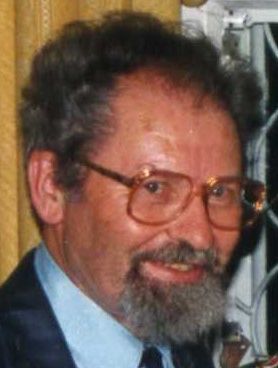Teacher. Participant in the Jewish human rights movement in Ukraine.
During the war, his family was evacuated to Astrakhan, then to Kuibyshev Oblast. He worked at a factory. After the war, he finished the 10th grade in the town of Călărași (Moldova). From 1949-53, he studied at the Odesa Institute of Foreign Languages. From 1953-55, by assignment, he taught English in a Ukrainian school in the town of Haivoron, Kirovohrad Oblast, and from 1955-70, in the city of Bender (Moldova). He was an excellent public educator.
Suslensky was concerned about the growing Russification of Jews and people of other nationalities, and the restrictions on the development of national minority cultures. He wrote letters to party and Soviet governing bodies and high-ranking officials. In 1968, he protested against the occupation of Czechoslovakia by Warsaw Pact troops. At pedagogical councils and teachers' conferences, he advocated for school reform and made proposals for improving teaching and educational work. He was criticized for “kowtowing to the West” and accused of “petty-bourgeois nationalism.”
On January 29, 1970, Suslensky was arrested in Bender and charged with “Zionist and anti-Soviet agitation and propaganda.” During a search of his home, tape recordings of BBC radio broadcasts and a diary where he recorded his thoughts were confiscated. His friend, the teacher Iosif Meshener, tried to defend Suslensky but was also arrested two weeks later. In April, the Supreme Court of the Moldavian SSR sentenced Suslensky under Article 67, Part 1 of the MSRR Criminal Code (analogous to Article 62 of the Ukrainian SSR Criminal Code) to 7 years in strict-regime camps (the prosecutor had proposed 2 years), and I. Meshener to 6 years.
Suslensky served his sentence in the camps of Mordovia. By 1973-74, he had been in Vladimir Prison on charges of systematic violation of the regime. In the camps of Perm Oblast at the end of 1974, Suslensky, together with Vladimir Balakhonov, developed the Regulations on Transitioning to Political Prisoner Status. On January 10, 1975, Suslensky, Yuriy Hrodetsky, Mykola Bondar, Anatoliy ZDOROVYI, and Vladimir Balakhonov submitted applications to the Presidium of the Supreme Soviet of the USSR demanding they be granted Political Prisoner Status. Having received no response, a month later they unilaterally transitioned to the status (refusing forced labor and compliance with other humiliating regime requirements).
Furthermore, in 1975, on behalf of his friends, Suslensky wrote an appeal to the governments of all countries and to the UN, asking them to pressure the USSR government to improve the conditions of political prisoners. It was signed by M. Bondar, Y. Hrodetsky, A. ZDOROVYI, P. KAMPOV, V. KALYNYCHENKO, and S. SAPELYAK. The appeal was successfully smuggled abroad and was broadcast on Radio Liberty. For his stinging statements, Suslensky was thrown into the punishment cell many times. In March 1975, he was again transferred by court order to Vladimir Prison, immediately placed on a reduced-ration regime with additional restrictions on correspondence and a ban on family visits. In January–February 1976, Suslensky suffered a severe heart attack, lost his speech, memory, and coordination. His cellmates M. Budulak-Sharygin, Z. ANTONYUK, H. PRYKHODKO, and A. ZDOROVYI protected him from being sent to a psychiatric hospital, cared for him, took him out for walks, and demanded medication.
He was released in 1977 after completing his prison term. He secretly took out a large amount of finely written information. He left for Israel. Valuing his camp friendship with Ukrainians, in 1979 he initiated the creation of the Society for Jewish-Ukrainian Relations, which he headed. The society aimed to improve relations between the Jewish and Ukrainian peoples. A great achievement of the Society was the recognition of many Ukrainians who saved Jews from the German Nazis as Righteous Among the Nations. Through the Society's efforts, a monument to the Jewish and Ukrainian victims of Nazism and Communism was unveiled on Mount Zion on May 13, 1985. The monument was destroyed by someone.
Suslensky traveled to Ukrainian settlements in Europe, the USA, and Canada to establish Jewish-Ukrainian cooperation, which was important for both peoples. In September 1992, he organized a week-long trip for Ukrainian political prisoners to Israel. He himself visited Ukraine many times.
He was rehabilitated in 1989. In 2007, he was awarded the Ukrainian Order “For Merit” III class. He is buried at the Har HaMenuchot cemetery in the Givat Shaul neighborhood of Jerusalem.
Bibliography:
1.
“Natsionalno-vyzvolna borotba i sionistskyi rukh” [“The National Liberation Struggle and the Zionist Movement”] // Homin Ukrainy. – 1979. – December 12;
“Voiienni zlochyntsi y ‘voiienni zlochyntsi’” [“War Criminals and ‘War Criminals’”] // Svoboda. – 1981. – August 19;
“Holovne zavdannia – likvidatsiia koloniialnoi systemy” [“The Main Task is the Liquidation of the Colonial System”] // Ukr. visti. – 1981. – September 27;
“Kara za viru” [“Punishment for Faith”] // Shliakh peremohy. – 1982. – June 13;
Pero moyo – vrag moy: Sbornik pisem, statey, ocherkov [My Pen is My Enemy: A Collection of Letters, Articles, and Essays]. – Jerusalem, 1999. – 450 pp.
2.
“Liudyna z velykoiu misiieiu v zhytti” [“A Man with a Great Mission in Life”] // Svoboda. – 1981. – April 16;
Rukh oporu v Ukraini: 1960 – 1990. Entsyklopedychnyi dovidnyk [Resistance Movement in Ukraine: 1960–1990. An Encyclopedic Guide] / Preface by Osyp Zinkevych, Oles Obertas. – K.: Smoloskyp, 2010. – pp. 637-638.
KHPG Archive: Interview with A. Zdorovyi, July 1, 2002.
Lukianenko, Levko. Z chasiv nevoli. Knyha chetverta: Kraina Moksel [From the Times of Captivity. Book Four: The Land of Moxel]. – K.: Feniks, 2010. – pp. 323-324, 413-419, 430, 441-442.

SUSLENSKY YAKIV MYKHAILOVYCH